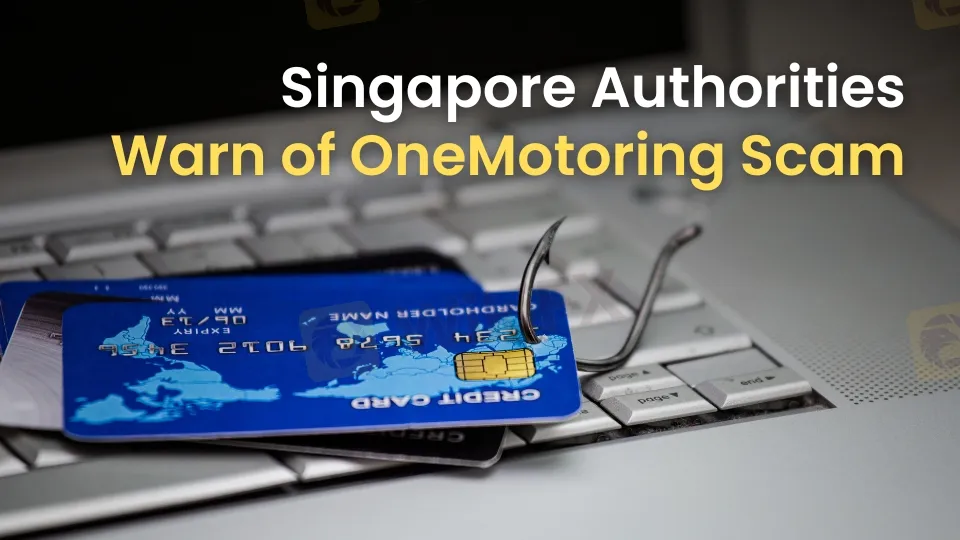简体中文
繁體中文
English
Pусский
日本語
ภาษาไทย
Tiếng Việt
Bahasa Indonesia
Español
हिन्दी
Filippiiniläinen
Français
Deutsch
Português
Türkçe
한국어
العربية
Singapore Authorities Warn Public of OneMotoring Phishing Scam, $407K Lost
Abstract:Scam alert! Impersonators posing as OneMotoring have stolen $407,000 through fake messages about unpaid transport bills. Police urge the public to stay alert.

Singaporeans are urged to stay vigilant against sophisticated phishing scams impersonating OneMotoring, with criminals stealing over $407,000 since December 2024 through fake transport bill alerts.
The Land Transport Authority (LTA) confirmed that fraudsters are sending deceptive SMSes claiming recipients have unpaid road tax or fines, embedding malicious links to cloned OneMotoring payment portals. Victims unknowingly surrender credit card details, only discovering unauthorized transactions later.
How the Scam Works:
- Victims receive texts pretending to be from OneMotoring about “overdue payments”
- Links direct to phishing sites mirroring the official LTA portal
- Stolen credentials enable instant financial theft

Legitimate LTA Notifications never include payment links. Official alerts arrive via:
- SMS from “gov.sg” sender ID
- E-letters in your OneMotoring account (accessible only via Singpass)
- Postal mail if you opted for hard-copy notices
This scam reflects a broader crisis – Singaporeans lost $1.1 billion to fraud in 2024 alone, with total scam losses exceeding $3.4 billion since 2019.
Protect Yourself:
✅ Verify sender IDs before clicking links
✅ Access OneMotoring directly via LTAs official website
✅ Enable transaction alerts for your bank cards
Police emphasize that urgent payment demands via SMS should always raise suspicion. When in doubt, contact LTA through verified channels to confirm any billing notices.

Disclaimer:
The views in this article only represent the author's personal views, and do not constitute investment advice on this platform. This platform does not guarantee the accuracy, completeness and timeliness of the information in the article, and will not be liable for any loss caused by the use of or reliance on the information in the article.
Read more

Breaking News: OmegaPro Caught in a $650 Million Forex and Crypto Investment Scam
An indictment was leveled against two men in the District of Puerto Rico for their alleged involvement in the operation and promotion of OmegaPro, an international investment scheme that has led to financial losses worth over $650 million for investors. Check more about this story

5 Reasons: Microtrade Is a Red Alert
Is MicroTrade a scam or is it safe? This is a common question for many who are looking to invest or trade. Check out this article and you’ll see it is an investment scam

No License, No Security: CNMV Issues List of 10 Illegal Firms
Spain's financial watchdog, the National Securities Market Commission (Comisión Nacional del Mercado de Valores, CNMV), has issued warnings against 10 unlicensed forex brokers operating without proper authorization.

RM71,000 Lost in a Share Scheme That Never Existed
A 40-year-old engineer from Malaysia lost RM71,000 after falling for a fake investment scheme advertised on Facebook.
WikiFX Broker
Latest News
Alchemy Markets Review 2025: Key Facts and Insights
Largest Market Makers
Temasek's portfolio scales new peak even as divestments hit over 2-decade high
Exposing Trade Capital Limited - Siphoning Millions, Restricting Withdrawals, Charging Extra Fees
GMI Edge: A Closer Look at Its Licenses
How Do I Place a Stop-loss Order?
5 Serious Warnings About Mirrox! You Can’t Afford to Ignore
FXPRIMUS: 5 Things They Don’t Want You to Know
Manual vs. Automated Forex Trading: Which One Should You Choose?
Mining firms lift FTSE 100 to record high after Trump confirms 50% copper tariff
Currency Calculator


